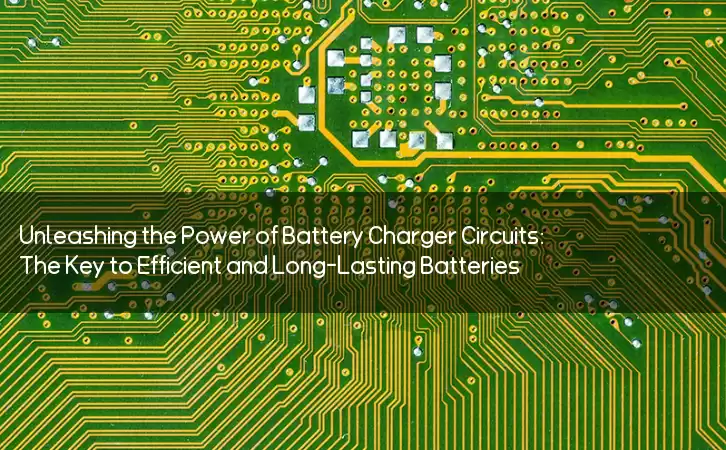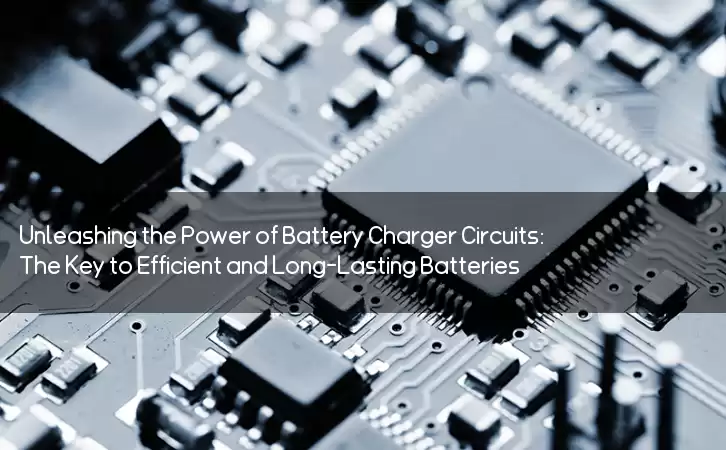Information Center
Unleashing the Power of Battery Charger Circuits: The Key to Efficient and Long-Lasting Batteries?
Published:2023-08-31 00:33:18 Author:Green WCND Views:77A battery charger circuit is an electronic circuit that is designed to recharge batteries. It is an essential component in many electronic devices that rely on rechargeable batteries, such as phones, laptops, and tablets. A battery charger circuit typically consists of several components, including a transformer, diodes, capacitors, and a voltage regulator.

The transformer is the central component of a battery charger circuit. It is responsible for converting the AC voltage from the electrical outlet into a DC voltage that can be used to recharge the battery. The transformer consists of two coils of wire wrapped around a magnetic core. When an AC voltage is applied to one coil, it induces a voltage in the other coil. This voltage is then rectified by the diodes and filtered by the capacitors to create a steady DC voltage.

The voltage regulator is another important component of a battery charger circuit. It is used to maintain a constant voltage level at the output of the circuit, regardless of variations in input voltage or current. This helps to ensure that the battery is charged safely and efficiently. There are several types of voltage regulators used in battery charger circuits, including linear regulators and switch-mode regulators.
Linear voltage regulators are the simplest and most commonly used type of voltage regulator in battery charger circuits. They operate by dissipating excess voltage as heat, which can result in lower efficiency and reduced battery life. Switch-mode regulators, on the other hand, use a combination of high-frequency switching and energy storage to regulate the voltage and minimize power loss.
In addition to the transformer, diodes, capacitors, and voltage regulator, a battery charger circuit may also include other components such as protection circuits and sensing circuits. Protection circuits are used to prevent overcharging or over-discharging of the battery, which can lead to damage or reduced battery life. Sensing circuits are used to monitor the voltage and current of the battery, which helps to ensure that it is charged safely and efficiently.
There are many different types of battery charger circuits, each designed for a specific type of battery. For example, a lead-acid battery charger circuit is designed for use with lead-acid batteries commonly used in cars and other vehicles. A lithium-ion battery charger circuit is designed for use with lithium-ion batteries commonly used in phones, laptops, and other portable devices.
In conclusion, a battery charger circuit is an essential component in many electronic devices that rely on rechargeable batteries. It consists of several components, including a transformer, diodes, capacitors, and a voltage regulator, and may also include other components such as protection and sensing circuits. There are many different types of battery charger circuits, each designed for a specific type of battery. A well-designed battery charger circuit can help to ensure that the battery is charged safely and efficiently, and can help to extend its lifespan.
Power Adapter Design and Customization Guide for Portable Electric KettlesI. Common Design Types for Portable Electric Kettle Power AdaptersPortable electric ke···
I. Common Design Types of Power Adapters External Independent Type (Most Common) Design: A standalone adapter (e.g., "black brick") connected to the p···
Handheld Vacuum Cleaner Power Adapter Selection GuideIntroductionHandheld vacuum cleaners have become a mainstream tool for household cleaning due to their port···
Drill Power Adapter Selection Guide.drill-container { font-family: Arial, sans-serif; line-height: 1.6; max-width: 800px; margin: 0 auto; padding: 20px; } .dril···





